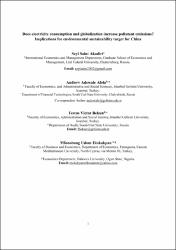| dc.contributor.author | Saint Akadiri, Seyi | |
| dc.contributor.author | Alola, Andrew Adewale | |
| dc.contributor.author | Bekun, Festus Victor | |
| dc.contributor.author | Etokakpan, Mfonobong Udom | |
| dc.date.accessioned | 2020-05-16T15:38:36Z | |
| dc.date.available | 2020-05-16T15:38:36Z | |
| dc.date.issued | 2020 | en_US |
| dc.identifier.issn | 0944-1344 | |
| dc.identifier.issn | 1614-7499 | |
| dc.identifier.uri | https://hdl.handle.net/11363/2136 | |
| dc.description | Document Information
Language:English
Accession Number: WOS:000529587300006
PubMed ID: 32350835 | en_US |
| dc.description.abstract | Giving that People's Republic of China is one of the two new frontiers of globalization, the country has continued to contend with the bottleneck of sustaining its economic growth amidst environmental hiccups arising from the drawbacks of globalization and energy consumption. By investigating the challenges of the country's drive toward environmental sustainability, the present study offers a new perspective on the role of electricity consumption and economic growth in a carbon-income function setting. This study also incorporates globalization into CO2 emissions equation for the experimental period of 1970-2014. Stationarity properties were ascertained by the Zivot and Andrew unit root test under a single structural break. Subsequently, the recent and novel combined cointegration test of Bayer and Hanck (2013) in conjunction with the Pesaran bounds testing approach is used to establish a cointegration relationship among the selected variables. Finally, the modified Wald test of the Toda-Yamamoto Granger causality test is employed to detect the direction of causality flows among the variables. Empirical piece of evidence finds a statistically positive correlation between electricity consumption and economic growth as seen in the long-run regression. This result is also affirmed by the Granger causality test. The test corroborates with the electricity-induced growth hypothesis in the case of China. However, there is an environmental trade-off, as more electricity consumptions spur increased carbon dioxide emissions (CO2). Our study finds empirical support that globalization reduced pollutant emissions in both the short and long run over our sampled period. Based on these results and outcomes, several policy prescriptions on the energy-income and environment nexus are renders for policymakers. Among such policy recommendations are (a) the need for the diversification of the Chinese energy mix to cleaner energy sources and renewables and (b) the need for decarbonization and adoption of carbon capturing and storage technologies. | en_US |
| dc.language.iso | eng | en_US |
| dc.publisher | SPRINGER HEIDELBERG, TIERGARTENSTRASSE 17, D-69121 HEIDELBERG, GERMANY | en_US |
| dc.relation.isversionof | 10.1007/s11356-020-08784-3 | en_US |
| dc.rights | info:eu-repo/semantics/openAccess | en_US |
| dc.rights | Attribution-NonCommercial-NoDerivs 3.0 United States | * |
| dc.rights.uri | http://creativecommons.org/licenses/by-nc-nd/3.0/us/ | * |
| dc.subject | Globalization | en_US |
| dc.subject | Electricity consumption | en_US |
| dc.subject | Carbon emission | en_US |
| dc.subject | Energy consumption | en_US |
| dc.subject | Economic growth | en_US |
| dc.subject | China | en_US |
| dc.subject | CO2 EMISSIONS | en_US |
| dc.subject | ECONOMIC-GROWTH | en_US |
| dc.subject | FINANCIAL DEVELOPMENT | en_US |
| dc.subject | ERROR-CORRECTION | en_US |
| dc.subject | COINTEGRATION | en_US |
| dc.subject | TRADE | en_US |
| dc.subject | NEXUS | en_US |
| dc.subject | POLICY | en_US |
| dc.title | Does electricity consumption and globalization increase pollutant emissions? Implications for environmental sustainability target for China | en_US |
| dc.type | article | en_US |
| dc.relation.ispartof | ENVIRONMENTAL SCIENCE AND POLLUTION RESEARCH | en_US |
| dc.department | İktisadi İdari ve Sosyal Bilimler Fakültesi | en_US |
| dc.relation.publicationcategory | Makale - Uluslararası Hakemli Dergi - Kurum Öğretim Elemanı | en_US |



















